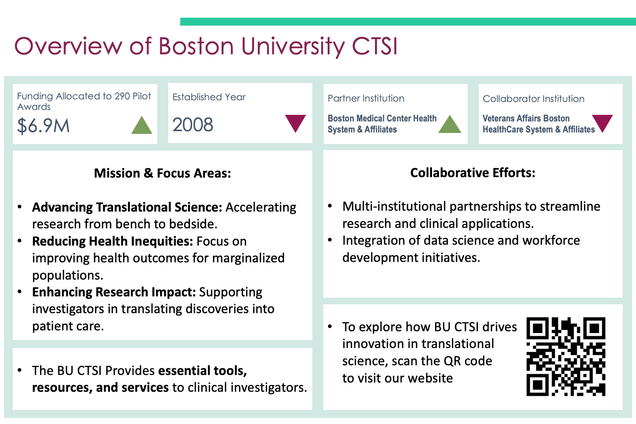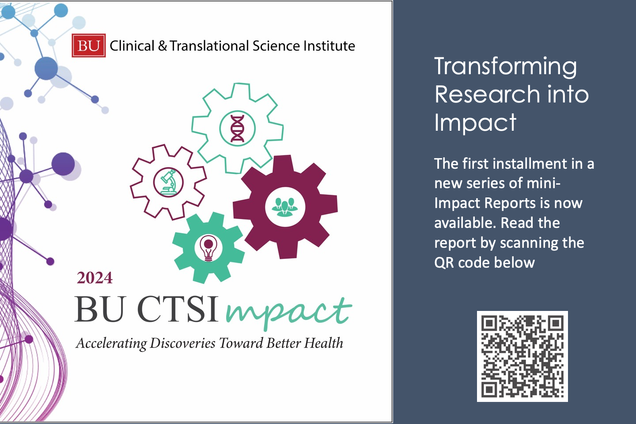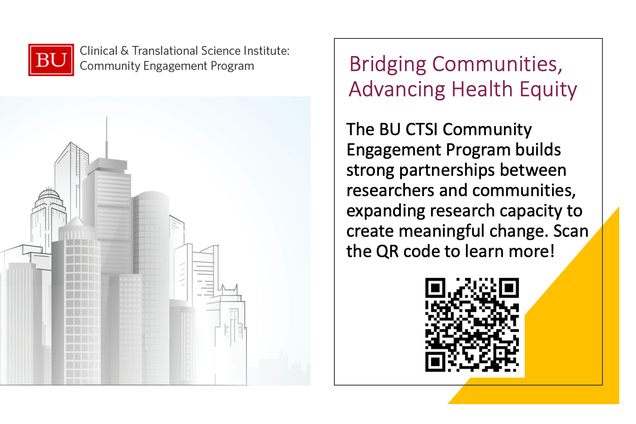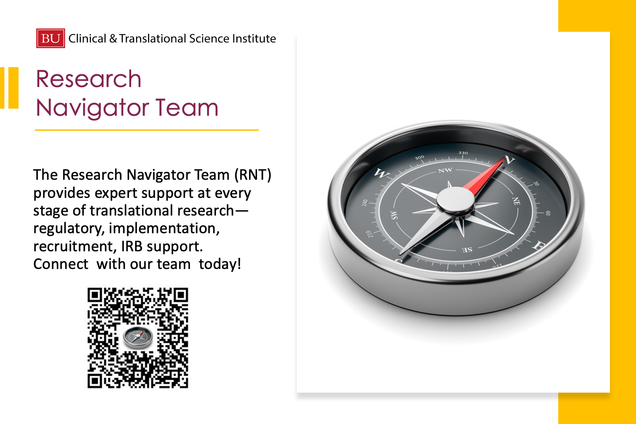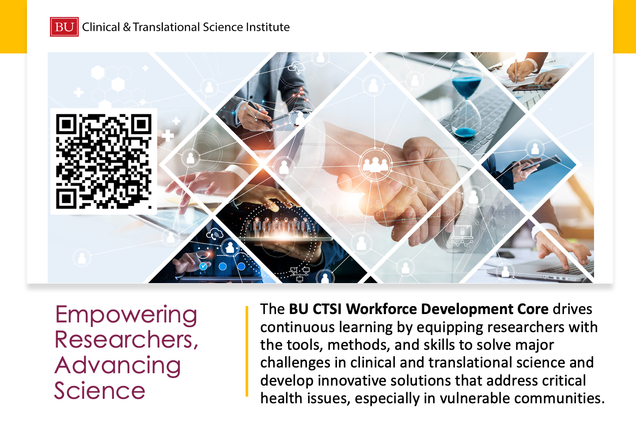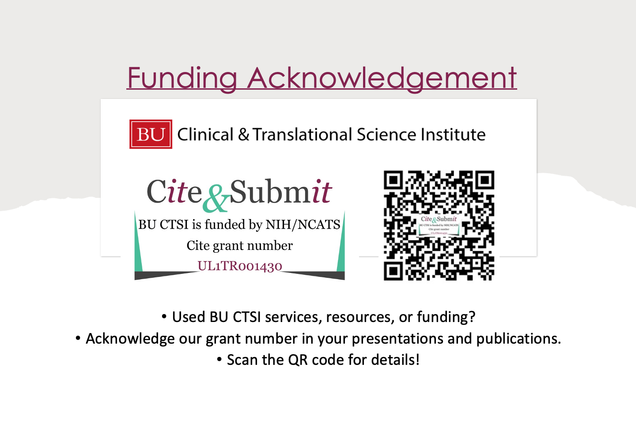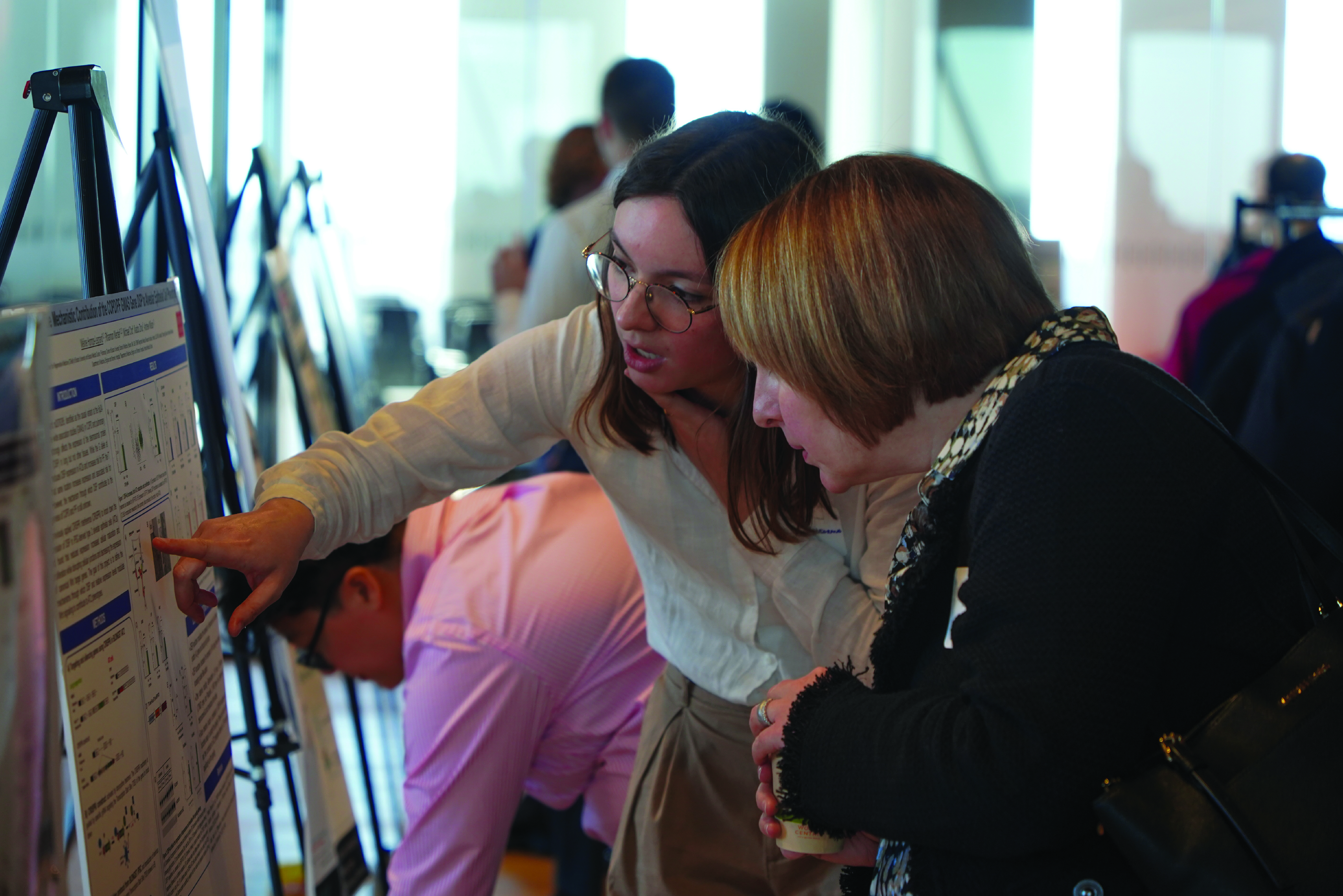Highlights from
the 12th Annual Translational Science Symposium
Advancing Translational Science Through Cutting-Edge Technology
Held on March 19, 2025 | 8:00 AM – 3:30 PM
Duan Family Center for Computing and Data Sciences
665 Commonwealth Ave, 17th Floor, Boston, MA
The Boston University Clinical & Translational Science Institute’s 12th annual Translational Science Symposium, In Memory of David Seldin, MD, PhD, spotlighted innovations in artificial intelligence and regenerative medicine. The event brought together researchers and experts for meaningful dialogue, collaboration, and the presentation of groundbreaking translational research. Catch up on the symposium sessions—recordings available here.
Featuring Keynote Speaker
Roy Perlis, MD, MSc.
Associate Chief for Research in the Department of Psychiatry, MGH
Director of the Center for Quantitative Health, MGH
Professor of Psychiatry, Harvard Medical School
Dr. Roy Perlis delivered the keynote address, drawing on his extensive research at the intersection of machine learning, genomics, and brain disease. His talk emphasized the growing role of AI in translational science and the future of personalized medicine.
Announcing the 2025 BU CTSI Poster Session Winners!
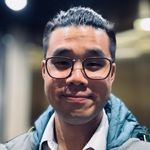
🏆 Kevin Chen – 1st Place
Boston University Chobanian & Avedisian School of Medicine
Kevin Chen is a third-year MD/PhD student in Dr. Darrell Kotton’s lab at Boston University’s Center for Regenerative Medicine (CReM), where he is focused on developing and testing airway stem cell therapies. Since beginning the MD/PhD program in 2020—at the height of the COVID-19 pandemic—Kevin has been motivated by the intersection of science and medicine and the collaborative spirit it requires. Inspired by CReM’s open-source, team-based approach to science, he is committed to translational research that advances new therapeutic options through transparency and collaboration.
“Transplanting Airway Basal Cells to Rescue CFTR Function”
This project explores a novel strategy to treat cystic fibrosis (CF) by reconstituting the airway stem cell compartment with autologous basal cells carrying a functional CFTR gene. Wild-type primary basal cells were transplanted into CFTR-deficient mice, resulting in airway epithelial regeneration and restoration of CFTR-dependent electrophysiologic current to levels comparable to those in healthy controls. These findings represent a critical step toward developing a mutation-independent, potentially curative therapy for CF patients who do not benefit from current treatments.
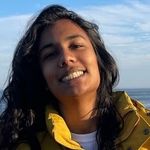
🏆 Varuna Jasodanand – 1st Place
Boston University Chobanian & Avedisian School of Medicine
Originally from Mauritius Island, Varuna Jasodanand is a PhD candidate in Behavioral Neuroscience at Boston University, working in Dr. Vijaya Kolachalama’s lab. Her research focuses on implementing and validating machine learning methods to improve the assessment and understanding of Alzheimer’s disease and related dementias.
“AI for Biological Alzheimer’s Disease Diagnosis and Staging”
This poster presents a multi-modal machine learning approach designed to evaluate amyloid and tau positivity in older adults. By integrating diverse data sources—including demographics, medical history, cognitive assessments, neuroimaging, and fluid biomarkers—the model supports a more personalized and precise method for diagnosing and staging biological Alzheimer’s disease.

🥉 KathrynAnn Odamah – 3rd Place
Boston University College of Arts and Sciences
KathrynAnn Odamah is a fifth-year Cellular & Molecular Biology PhD candidate in Dr. Hengye Man’s lab. She received her B.S. in Neuroscience from Duke University and enjoys training for powerlifting competitions and learning about therapeutic innovations for X-linked neurodevelopment disorders.
“Investigation of Rescue Strategies for Nexmif-Dependent Autism Spectrum Disorder”
Kathryn’s poster investigates the use of genetic restoration strategies to rescue neuronal impairments and behavioral deficits in a Nexmif knockout mouse model of Autism Spectrum Disorder. Her work demonstrates both DNA methylation inhibitors and CRISPR activation system to induce reactivation of the silenced Nexmif allele in female mice, and postnatal lentiviral restoration in male mice.

🥉 Braden Pate – 3rd Place
Boston University Chobanian & Avedisian School of Medicine
Originally from Butler, PA, Braden Pate earned his bachelor’s in Biology from Colorado State University and now researches in the Vanuytsel Lab at the Center for Regenerative Medicine (CReM).
“Sickle Cell Disease-Specific iPSC Platform as a Preclinical Screening Tool”
This project leverages patient-derived iPSCs to model sickle cell disease, enabling tailored drug testing on erythroid progenitor cells. By capturing individual genetic backgrounds, Braden’s platform may help personalize and improve treatment strategies in the clinic.
Speakers Bios
 Dr. Megan Bair-MerrittDr. Bair-Merritt is a Professor of Pediatrics and is a multi-PI of the BU CTSI. She is a general pediatrician and child health services researcher who has conducted social epidemiology and intervention research in the area of family violence for over 15 years. She has published 95 scientific and/or invited articles, 14 letters/editorials, and 10 book chapters that predominantly focus on family violence and child health. She has received three R01-level awards as PI (and 3 additional awards as Co-I) from the National Institute of Justice and the Maternal and Child Health Bureau (federal funding for violence research generally comes from non-NIH institutes), an AHRQ T32 training grant, and multiple large foundation grants. She also serves as the Executive Director of Pediatrics’ Center for the Urban Child and Healthy Family and as Chair of Women’s Leadership through the Boston University Medical Group’s Office of Equity, Vitality, and Inclusion. Her scholarly work has moved forward the field’s understanding of how intimate partner violence (IPV) affects children, influenced how IPV screening and related interventions are implemented in the medical setting, and shaped conceptualizations of relationships with teen dating violence. Her publications have been cited in critical policy pieces and clinical guidelines including the Institute of Medicine’s consensus report Clinical Preventive Services for Women: Closing the Gaps, the World Health Organization’s Guidelines for Prevention and Clinical Intervention for Female Survivors of Intimate Partner Violence, the United States Preventive Services Task Force’s recommendation for Intimate Partner Violence and Abuse of Elderly and Vulnerable Adults: Screening, as well as the American Academy of Pediatrics guidelines on IPV screening in the pediatric setting. She recently was invited to present about IPV homicide at the National Academy of Science, Engineering and Medicine’s Workshop on Firearm Injuries and Death.
Dr. Megan Bair-MerrittDr. Bair-Merritt is a Professor of Pediatrics and is a multi-PI of the BU CTSI. She is a general pediatrician and child health services researcher who has conducted social epidemiology and intervention research in the area of family violence for over 15 years. She has published 95 scientific and/or invited articles, 14 letters/editorials, and 10 book chapters that predominantly focus on family violence and child health. She has received three R01-level awards as PI (and 3 additional awards as Co-I) from the National Institute of Justice and the Maternal and Child Health Bureau (federal funding for violence research generally comes from non-NIH institutes), an AHRQ T32 training grant, and multiple large foundation grants. She also serves as the Executive Director of Pediatrics’ Center for the Urban Child and Healthy Family and as Chair of Women’s Leadership through the Boston University Medical Group’s Office of Equity, Vitality, and Inclusion. Her scholarly work has moved forward the field’s understanding of how intimate partner violence (IPV) affects children, influenced how IPV screening and related interventions are implemented in the medical setting, and shaped conceptualizations of relationships with teen dating violence. Her publications have been cited in critical policy pieces and clinical guidelines including the Institute of Medicine’s consensus report Clinical Preventive Services for Women: Closing the Gaps, the World Health Organization’s Guidelines for Prevention and Clinical Intervention for Female Survivors of Intimate Partner Violence, the United States Preventive Services Task Force’s recommendation for Intimate Partner Violence and Abuse of Elderly and Vulnerable Adults: Screening, as well as the American Academy of Pediatrics guidelines on IPV screening in the pediatric setting. She recently was invited to present about IPV homicide at the National Academy of Science, Engineering and Medicine’s Workshop on Firearm Injuries and Death.
Dr. Batmanghelich is an Assistant Professor of Department of Biomedical Informatics and Intelligent Systems Program at the University of Pittsburgh and an adjunct faculty in the Machine Learning Department at the Carnegie Mellon University. His research is at the intersection of medical vision, machine learning, and bioinformatics. He develops algorithms to analyze and understand medical image along with genetic data and other electrical health records such as the clinical report. He is interested in method development as well as translational clinical problems.
Dr. Center is the Gordon and Ruth Snider Professor of Pulmonary Medicine, Associate Provost for Translational Research, and Director of the BU Clinical and Translational Science Institute. For 36 years, he has been the Chief of the Pulmonary, Allergy, Sleep, and Critical Care Division having added Allergy and Sleeps accreditation to the program during his tenure. In that position, he supervises 50 MD and PhD clinical and research faculty and over 20 post-doctoral fellows in 3 major research areas (Health Sciences Research and Informatics, Developmental Biology and Regenerative Medicine, and Lung Inflammation and Immunity). He is a co-discoverer of Interleukin-16 which is the topic of BU-owned intellectual property licensed by multiple bioscience companies. He has been the PI of R01, P50, P01, UL, U54, U19, and T32 grants and the mentor for 8 K08s. He is the Founding Director of the Boston University Clinical and Translational Science Institute since its inception in 2008 and the PI of its NCATS-sponsored Clinical and Translational Science Award.
Dr. Chen is the William Fairfield Warren Distinguished Professor of Biomedical Engineering at Boston University, Founding Director of the Biological Design Center, and Core Faculty of the Wyss Institute for Biologically Inspired Engineering at Harvard University. …
The 12th Annual CTSI Symposium Agenda
2025 Symposium Social Media Wall
Access to the BUCTI_Symposium2025 Social Media Wall below.
Symposium Poster Videos
-
Chakraborty, Amit — LSD1 Regulates Cancer Immune Response by Regulating MHC-I of Cancer Cells — Boston University Henry M. Goldman School of Dental Medicine (GSDM)
-
Chen, Fanying — Using AI to Reduce Waiting Times for Dermatological Care — Boston University Questrom School of Business (QST)
-
Chen, Kevin — Transplanting Airway Basal Cells to Rescue CFTR Function — Boston University Chobanian & Avedisian School of Medicine
-
Cranston, Sam — Developing Age-Equivalent In Vitro Models of Centenarian Resilience — Boston Medical Center (BMC)
-
Delgado, Jose — Care Coordination Challenges and Child Health Status Among Allergic Youth: NSCH — Boston University School of Public Health (SPH)
-
Dohadwala, Sarah — Bacterial Vaginosis–Associated Sialidases Impair Sperm Function — Boston University Graduate Medical Sciences (GMS)
-
Dowrey, Todd — Understanding the Molecular Mechanisms of Exceptional Longevity — Boston University Graduate Medical Sciences (GMS)
-
Ferri, Grace; Hensien, John — Finding Ferritin Footprints in 5-Fluorouracil–Induced Cardiotoxicity — Boston Medical Center (BMC)
-
Flores, Elizabeth — An iPSC-Derived Human Intestinal Organoid Model of Ebola and Marburg Infection — Boston University Chobanian & Avedisian School of Medicine
-
Hao, Stephanie — Immune Signatures of Lasting Vaccine Immunity Through Systems Immunology — Boston University Chobanian & Avedisian School of Medicine
-
Homps-Legrand, Meline — Mechanistic Contribution of the COPD/PF GWAS Gene DSP to Alveolar Phenotypes — Boston University Chobanian & Avedisian School of Medicine
-
Jasodanand, Varuna — AI for Biological Alzheimer’s Disease Diagnosis and Staging — Boston University Chobanian & Avedisian School of Medicine
-
Kerr, Charles — Development of a Universal CAR T Cell — Boston University Chobanian & Avedisian School of Medicine
-
Kroehling, Lina — High-Resolution Characterization of Age-Specific Changes in HPV-Negative HNSCC — Boston University Faculty of Computing & Data Sciences (CDS)
-
Labott, Madeline — Spatial Profiling of the Hematopoietic Stem Cell Niche in the Human Fetal Liver — Boston University Graduate Medical Sciences (GMS)
-
Lee, Junsoo — Flexural Properties of Three Ceramic-Filled Resin Composite Materials — Boston University College of Arts and Sciences (CAS)
-
Lee, Songhyeon; Hennessy, Erica — Tooth Surface Microhardness After Biomimetic Remineralization — Boston University Henry M. Goldman School of Dental Medicine (GSDM)
-
Li, Yeting — PRIUS Decodes BRD4-Mediated Chromatin Remodeling Driving Fibroblast Activation — Boston University Faculty of Computing & Data Sciences (CDS)
-
Lu, Simon — Unmasking JAK2V617F Megakaryocytes: Insights from Single-Cell RNA Sequencing — Boston University Chobanian & Avedisian School of Medicine
-
Mahmut, Dilnar — Endothelial Cell Therapy to Repair the Liver Vascular Network — Boston University Chobanian & Avedisian School of Medicine
-
Merritt, Carly — Particulate Matter Induces an Inflammatory Phenotype in AT2s — Boston University Chobanian & Avedisian School of Medicine
-
Morningstar, Samuel — VEGFA mRNA–LNP to Treat Liver Disease by Cholangiocytes to Hepatocytes — Boston University Chobanian & Avedisian School of Medicine
-
Odamah, KathrynAnn — Investigation of Rescue Strategies for NEXMIF-Dependent Autism Spectrum Disorder — Boston University College of Arts and Sciences (CAS)
-
Pate, Braden — Sickle Cell Disease–Specific iPSC Platform as a Preclinical Screening Tool — Boston University Chobanian & Avedisian School of Medicine
-
Prasad, Minali — Associations Between Retinal Cell Thickness and Eye Fluid Biomarkers — Boston University Chobanian & Avedisian School of Medicine
-
Rich, Zachary — Transitions from Injection to Respiratory Opioid Use in the Fentanyl Era — Boston Medical Center (BMC)
-
Skeete, Chelsey — Opioid Signaling Enhances Microglial HIV-1 Infection and Inflammatory Responses — Boston University Graduate Medical Sciences (GMS)
-
Taglauer, Elizabeth — Multi-Omic Analysis of Placenta-Driven Preeclamptic Developmental Lung Injury — Boston Medical Center (BMC)
-
Xi, Zhan — Spatial Immune Dysregulation in Lymph Nodes of NSCLC Patients — Boston University Chobanian & Avedisian School of Medicine
-
Xu, Junxiang — Spatial Profiling of the Pancreatic Neuroendocrine Tumor Microenvironment — Boston University Graduate Medical Sciences (GMS)
-
Yiannakou, Ioanna — mDASH and Cardiometabolic Outcomes — Boston University Chobanian & Avedisian School of Medicine
Getting to the BU CTSI Symposium: Travel & Parking Information
🚗 Getting to the BU CTSI Symposium: Travel & Parking Information
📍 Event Location:
Duan Family Center for Computing & Data Sciences
665 Commonwealth Ave, 17th Floor, Boston, MA
- Public Transit: Take the MBTA Green Line (B branch) to BU Central or BU East.
- Driving: Use 665 Commonwealth Ave, Boston, MA for GPS navigation.
🚗 Recommended Parking
- CAS Lot (725 Commonwealth Ave)
- Warren Towers Garage (700 Commonwealth Ave)
🚍 For BU Faculty, Staff, and Students
- CRC/BUMC Reciprocal Parking: Faculty and staff with parking permits can park on both the Charles River and Medical Campuses.
- 1BU Shuttle: Connects BU Medical Campus (BUMC) and Charles River Campus (CRC), available to BU students, faculty, and staff.
For more details on travel and parking, visit BU Parking & Transportation.
To find and book parking spots in advance use this link: Boston University Parking | Book Parking Near BU | SpotHero
Discover the Legacy of David Seldin, MD, PhD (1957-2015)
Discover the Legacy of Dr. David Seldin
In Grateful Recognition
Dr. David Seldin was a founding member of the BU CTSI in 2008. He made critical contributions to our Core Facilities program, instituting a highly innovative core voucher system to subsidize usage.
He is best remembered for organizing this annual Translational Science Symposium. Every part of the day bears his signature—from the idea itself to the selection of speakers, poster sessions, and venue.
His vision and wisdom continue to inspire us, and we hope these annual symposia reflect his sincere love of science. He always wanted it to be fun.
Dr. Seldin was a Professor of Medicine and Microbiology at Boston University School of Medicine. He became Director of the Amyloidosis Center in 2007 and Chief of the Section of Hematology-Oncology in 2008.
His research focused on cancer and blood disorders, particularly the light chain form of amyloidosis.
Join Us in Continuing His Legacy
Let’s carry forward Dr. Seldin’s legacy of excellence and innovation in Translational Science. Together, we can make a difference!
Ways to Contribute:
The David C. Seldin, M.D., Ph.D. Professorship in Medicine
The David C. Seldin M.D., Ph.D. Amyloid Research Training Fund
How to Contribute:
To make a contribution in Dr. Seldin’s memory, contact the BUSM Development Office:
📞 Call: 617-638-4570
📧 Email: busmdev@bu.edu





